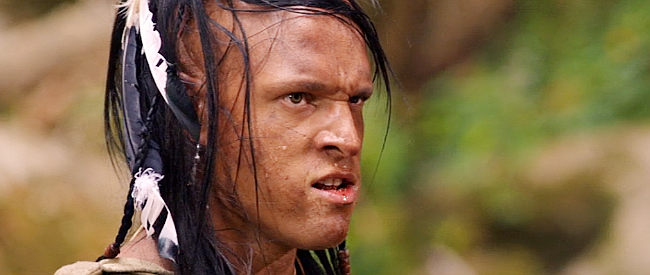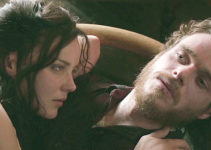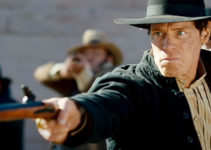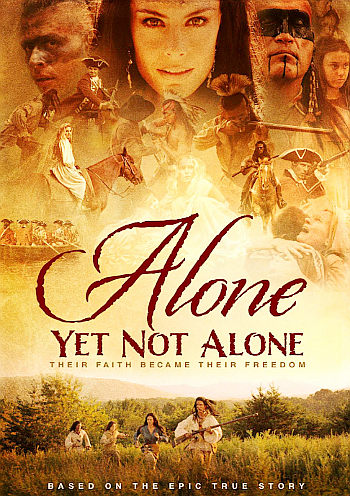 The Leininger family leaves Germany for the American colonies in search of freedom and land they can call their own.
The Leininger family leaves Germany for the American colonies in search of freedom and land they can call their own.
They find both in Penn’s Creek, Pa., and have harvested a successful first crop when fears of Indian hostilities sweep the area.
The Delaware tribes have decided to reclaim land lost to the English. And, sure enough, they raid Penn’s Creek.
By the time they leave, the patriarch of the Leininger family and one of his sons are dead, their farm is ablaze, and two daughters — Barbara, 12, and Regina, 9 — have been taken by the Indians.
Their mother and another son are spared because they were away at the time.
So begins a years-long ordeal of captivity for Barbara and Regina, who are soon separated, and for Marie LeRoy, a good friend of Barbara’s who is captured in the same raid.
Marie and Barbara remain together, but endure new lives that are strikingly different.
Barbara is courted by a chief’s son named Galasko, the very man who took her father’s scalp. Marie is put under the care of a cruel, elderly Indian woman.
Together, they eventually decide to try to escape with the help of two male captives, knowing from experience that to be caught means almost certain death.
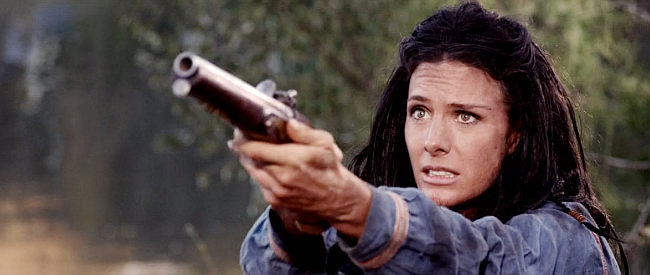
Kelly Grayson as Barbara Leininger, remembering her father’s long-ago lesson in how to fire a pistol in Alone Yet Not Alone (2013)
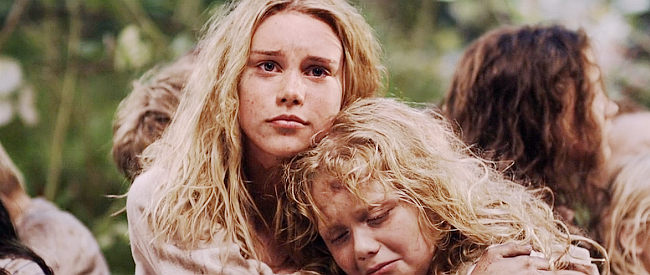
Natalie Racoosin as young Barbara, comforting her sister Regina (Cassie Brennan) shortly after they’re captured in Alone Yet Not Alone (2013)
The film is too freshly scrubbed and not nearly gritty enough to be completely successful, from the idyllic depiction of frontier life to the fresh-out-of-makeup appearance of Barbara after a 200-mile journey to escape her captors.
Then there are the clichés. Delaware Chief Selinquaw has a kind son (Galasko) and a mean one (Hannawoa). The former falls for the pretty captured girl. And the latter is jealous of the former.
Hannawoa is also left in charge of the Indian camp when the warriors march off to battle the British, but inexplicably abandons his post to track down the escaped captives, who somehow know he’s trailing them though they never see him.
All that said, the film also delivers a fair share of heart-warming moments and benefits from an excellent performance from Natalie Raccoosin as young Barbara.
And don’t be scared off by it’s reputation as a faith film. Yep, there’s are lots of references to Christianity. But wouldn’t a person of religion turn to their faith for comfort in such peril? The film doesn’t come across as preachy.
It’s also pretty true to the narrative Marie La Roy and Barbara Leininger penned about their three years of captivity, though there’s no mention of a romance with the handsome son of an Indian chief in that telling.
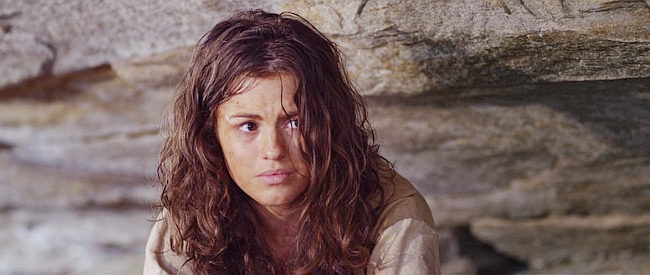
Victory Emmons as Marie LeRoy, Barbara’s longtime friend among the captives in Alone Yet Not Alone (2013)
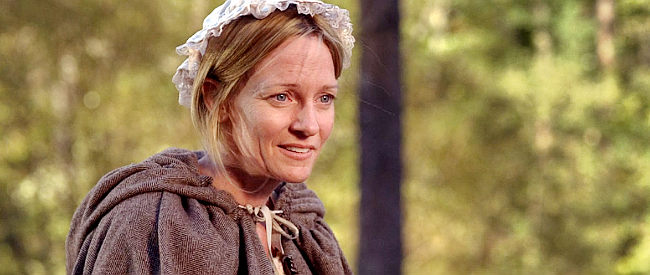
Joanie Stewart as Mama Leininger, bidding farewell to her daughters as she heads off to market in Alone Yet Not Alone (2013)
Directed by:
Ray Bengstone
George D. Escobar
Cast:
Kelly Greyson … Barbara Leininger / Susquehana
Victory Emmons …. Marie LeRoy
Hayley Lovitt … Regina Leininger / Tskinnak
Robert Pierce … Papa Leininger
Joanie Stewart … Mama Leininger
Joseph Gray … John Leininger
James Hartner … Christian Leininger
Jenn Gotzon … Lydia Barrett
Clay Walker … Fritz Hecklinger
Brett Harris … Owen Gibson
Jeohn Teifer … David
Ozzie Torres … Galasko
Tony Wade … Hannawoa
Ron Pinson Jr. … Chief Selinquaw
Natalie Racoosin … Young Barbara
Kelly Devens … Young Marie
Cassie Brennan … Young Regina
Runtime: 103 min.
aka:
Massacre at Buffalo Valley
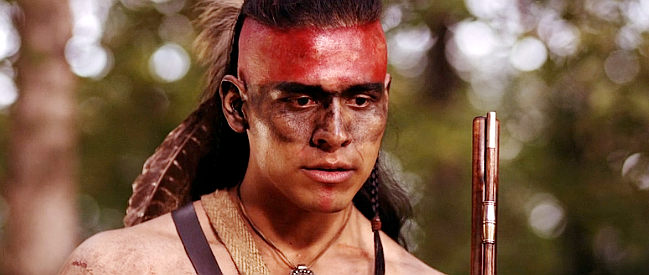
Ozzie Torres as Galasko, favored son of Cheif Selinquaw and the Indian brave who falls in love with Barbara in Alone Yet Not Alone (2013)
Memorable lines:
Papa Leininger, to his family, as word of Indian hostilities reach them: “Danger and struggles and sacrifice, they go hand in hand. They are the price we pay for our freedom.”
Barbara: “Even if the Indians attack?”
Papa Leininger: “Yes, Barbara. Even if they take our lives, we would still be free. And what could be more wonderful than to go from our beautiful valley straight to heaven?”
Galasko to Barbara: “Galasko is Indian. And Susquehanna is now Indian. You must believe in Indian god.”
Marie to Barbara, after Galasko has proposed she become his wife: “He killed your family. Your father’s scalp hangs over the door of Glasko’s longhouse. How could you do this?”
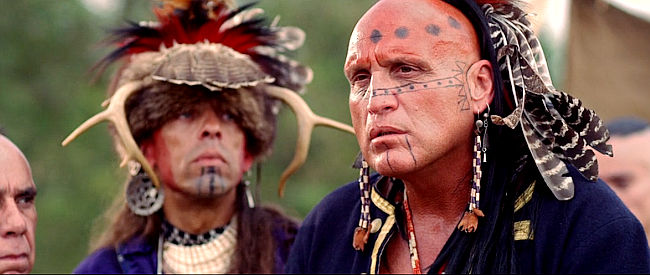
Ron Pinson Jr. as Chief Selinquaw, leader of the Delaware tribe that takes the Leininger sisters captive in Alone Yet Not Alone (2013)

Paul Ganus as Capt. Armstrong of the Pennsylvania militia, about to lead a raid on a Delaware camp in Alone Yet Not Alone (2013)
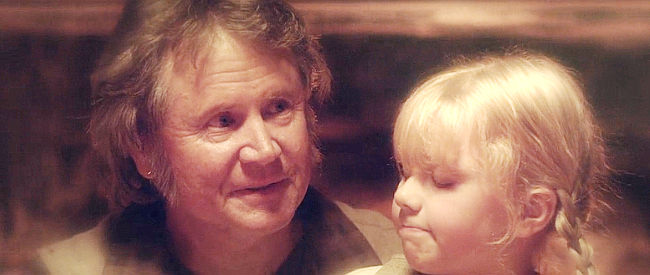
Robert Pierce as Papa Leininger with young Regina in a flashback scene from Alone Yet Not Alone (2013)
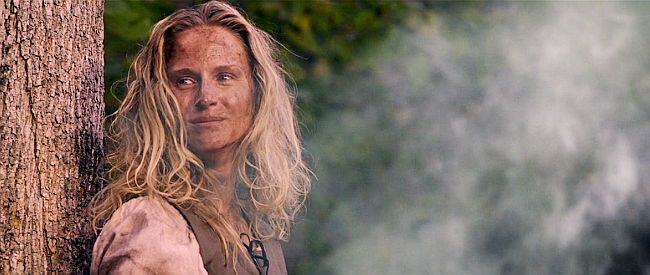
Jenn Gotzon as Lydia Barrett, the woman who pays a high price for attempting to escape in Alone Yet Not Alone (2013)
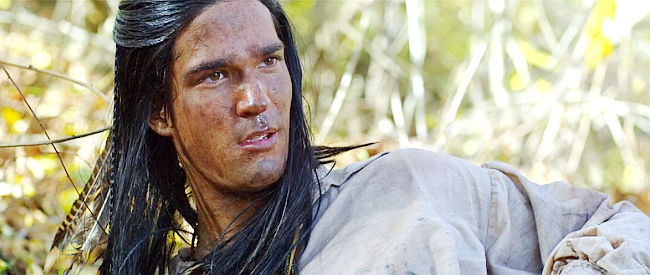
Brett Harris as Owen Gibson, the male captive who leads the escape attempt in Alone Yet Not Alone (2013)
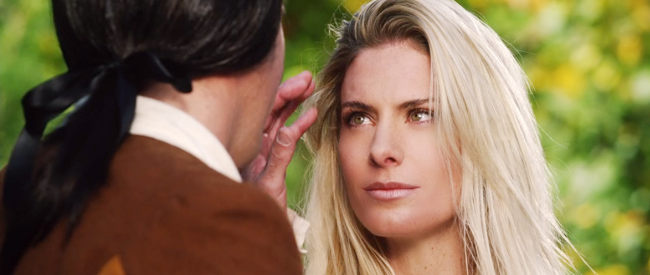
Kelly Greyson as Barbara Leininger with Fritz Hecklinger, the man she intends to marry in Alone Yet Not Alone (2013)

